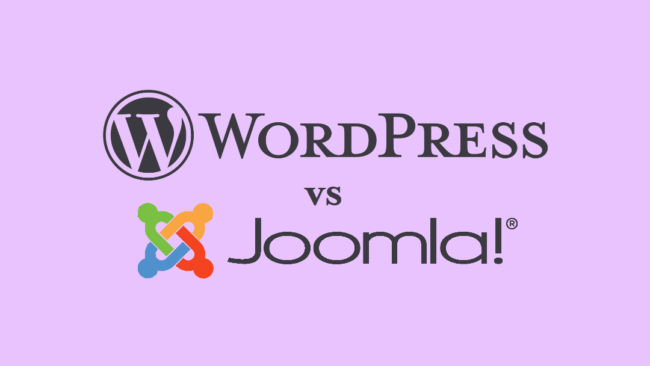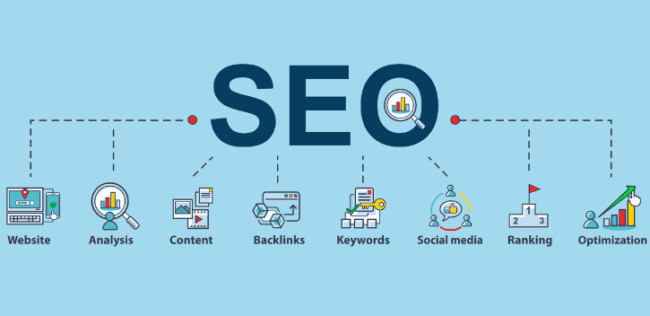The Best CMS Between Joomla and WordPress?

When you are planning to build a website, the most crucial decision you have to make is deciding what type of content management system (CMS) you will be using. A content management system is usually the preferred choice for building a website or a blog.
It makes it easier for people with no experience with web design to make changes to the websitMakinging minor edits to the key pages, uploading images, or adding blog posts could quicklyily done using a CMS platform.
When we talk about CMS, the two most popular tools one can use to create and run a website are WordPress and Joomla. But of the two, which one should you choose and why? In this post, we are running through the most debated topic of 2022 – Joomla vs. WordPress.
If you go with the wrong CMS, you will have difficulty moving your website to another platform when required.
Joomla and WordPress have their own set of extensions and themes that the websites run, making them incompatible with other CMSs. Well, migrating your website to another CMS platform is difficult. Also, the migration of functionality and layout of the website to another CMS platform is next to impossible.
Hence, choosing the right CMS platform is critical for your website. If you are confused between Joomla and WordPress CMS, you need to start understanding the strengths and weaknesses of both CMS platforms before building your website.
So, let’s start with our Joomla vs. WordPress comparison review and look at what these two tools are, what they do, and which one’s the best.
Joomla vs. WordPress – what’s common
Joomla and WordPress are the web’s most popular CMS platforms with a lot in common regarding philosophy, technology, and community. For starters:
- Joomla and WordPress are both open source and free software licensed under the General Public License (GPL)
- Both Joomla and WordPress are written primarily in PHP
- Joomla and WordPress support MySQL as their database management system (DBMS). Although WordPress only supports MySQL, Joomla can support other database management systems.
- Both Joomla and WordPress use templates and themes for the visual appearance of sites, extensions, modules, and plugins to extend features.
- Joomla and WordPress are all community-driven projects since they are open source.
Although Joomla and WordPress have many similarities, they differ in many aspects.
Their policies are different regarding core software, security matters, and Operational, among other aspects.
These dissimilarities make a significant impact on the users, and it influences how they build their websites.
With that said, let’s look at how Joomla and WordPress compare to each other.
WordPress: Best Open Source Content Management System
WordPress is highly popular among small business owners, content creators, and bloggers. However, big companies like Spotify, CNN, and Time Magazine use WordPress for their content needs.
WordPress is a fully functional content management system that powers approximately 33% of the world’s top websites. Regarding Joomla and WordPress comparison, WordPress is probably the most potent yet effective website and blogging content management system today.
It is powerful enough for web developers to efficiently build websites for clients while allowing them to make real-time changes.
Since installing WordPress is relatively easy, the efforts to set up a website or blog are shallow. However, the following salient features of WordPress allow you to get a simple site up and running within a few seconds.
- You can build a powerful website using WordPress. The best part about this is that the end user doesn’t require excellent technical knowledge to set it up. WordPress boasts a user-friendly and highly intuitive user interface, making it easier for the end-users to use the CMS platform without hassle.
- WordPress allows for multiple user integration, meaning numerous authors can contribute to the website content.
- WordPress has a massive community of developers who have developed thousands of templates and plugins for WordPress, which is unique since it allows developers to create compelling websites.
- Plugins of WordPress have helped developers with on-page SEO in WordPress.
- Since WordPress offers a plethora of customized themes and plugins, there are endless possibilities awaiting developers. WordPress provides everything from building simple blogs to e-commerce stores and even complex, powerful websites.
- When we talk about the WordPress community, you will get all the answers to the problems you are having related to WordPress. It is a healthy community, offering free support to WordPress developers.
However, there are some issues concerning the security of WordPress. It doesn’t come with trusted security measures, and the developers have to rely on third-party plugins to enhance the safety of their sites.
On the other hand, those relatively new to WordPress may find it difficult to update the WordPress installation to a more recent version from their older plugins.
This can affect the functionality of the website altogether. Lastly, WordPress is not recommended for high content volumes.
Having said all this, WordPress is suitable for:
- Serious publications require content contribution from numerous authors
- Websites requiring some quick scalability regarding the addition of new features
- News sites or blogging sites
- Simple websites for SMEs
Joomla: Best Content Management for Developers
Joomla, like WordPress, is an open-source CMS platform that allows developers to create powerful applications and web content. Joomla has been considered an excellent alternative to WordPress over the years.
However, Joomla inclines towards tech-savvy folks more than a regular users. It allows for multiple database options, which is essential for high-end developers. But, if you are not into complex web application development, these high-end features won’t mean anything to you.
Although it offers the user-friendliness of WordPress, some of the Joomla modules are paid versions. Popular websites powered by Joomla include The Hill, Harvard University, and MTV Greece.
Moreover, it offers a wide range of extensions categorized as languages, modules, templates, plugins, and components. As a result, Joomla can handle a significant column of content compared to other CMS platforms like WordPress. Further, its server resource utilization is more.
Although installing and setting up Joomla is easy, it is difficult to integrate third-party scripts. Therefore, developing high-end web applications with Joomla requires a lot of time investment. On the other hand, Joomla is not search engine friendly and doesn’t offer excellent optimization capabilities.
One of the most significant disadvantages of this CMS platform is that it doesn’t provide the Access Control List (ACL). This means websites made with Joomla cannot have specific access to particular pages of the website. Thus, Joomla is unsuitable for enterprise customers.
Having said all this, Joomla is suitable for:
- Small e-commerce stores
- Websites that need more flexibility and ease of use with the structure and content
Joomla vs. WordPress – In a Nutshell
| Attributes | WordPress | Joomla |
| Skill Level Required | Easy | Moderate |
| Number of Downloads | More than 140 million | More than 30 million |
| Multilingual capabilities | Not straight out of the box | Yes |
| Minimum Memory required to run this application | 60 MB
|
256 MB
|
| The average frequency of Updates | 42 Days
|
36 Days
|
| Best Used for | For creating e-commerce stores or informative websites | For creating extensive product catalogs or online forums |
| Plugin Availability | 54,226
|
7905
|
| Installation Time | 5 Minutes
|
10 Minutes
|
| Free themes | More than 2000+
|
900+
|
| Level of Security | Good
|
Okay |
| Available free plugins | 27000
|
7000
|
| DBMS support | MYSQL | SQLite, PostgreSQL, SQLAzure, SQLServer, and MySQL |
| Level of Skills Needed | Technical Expertise is not needed | You Would Need a bit of technical knowledge |
| Security | Moderate | Low |
| Performance | Although it handles lower traffic quite quickly, a better hosting plan is required for driving higher traffic. | It needs alteration to avoid quick resource consumption |
| Scalability | High | Low |
| SEO | Excellent for SEO | Basic SEO |
| Extensions | Plugins& Widgets
|
Components, Modules & plugins
|
| Design | Widget areas
|
Positions |
| E-Commerce | Comes with woocommerce plugin
|
Incorporates
Virtuemart for managing products and content.
|
| Best Features | Plugins & WordPress premium themes
Easy to manage Customizable |
Easy CMS to make websites
Great community Highly stable |
Joomla vs. WordPress: Security

Joomla and WordPress have been created using specific security standards. However, any website owner is accustomed to the inherent risk of operating a website.
Automatic hacking attempts and spam are expected on any website. Although many safety measures lay within the website hosting provider, your preferred CMS also needs to be able to deal with specific threats.
So, which CMS is more secure? WordPress or Joomla? Let’s find out.
WordPress Security
When discussing WordPress security, you can take several actions to lock down your site to avoid spammers, vulnerabilities, and hackers from affecting your website or e-commerce site.
WordPress has always remained the prime target for hackers due to its popularity. However, the current security concerns are often associated with third-party plugins, not the content management system itself.
So, is WordPress secure? For the most part, yes. WordPress is inherently not a safe platform to use for a business. This is because users are blindly following industry-proven security worst approaches.
If you are using nulled plugins, outdated WordPress software, have poor credentials management and system administration, and lack required security and web knowledge amongst non-techie users, your WordPress site is vulnerable to hacking.
Since WordPress powers the world’s 33% of all websites, with thousands of plugin and theme combinations, it is no surprise that vulnerabilities are constantly being discovered.
But, thanks to a fantastic community of WordPress advocates across the globe, these vulnerabilities are patched as soon as possible.
Vulnerabilities of WordPress may include –
- Denial of service
- Cross-site scripting
- Malicious redirects
- Brute-forced login attempts
- Pharma attacks
- Backdoors
According to a report, more than 100,000 websites are hacked daily. This is the main reason every website owner needs to follow specific security measures to ensure that their site is safe and secure from any malicious activities of a hacker.
One of the most significant disadvantages of WordPress security is the user. The primary reasons why WordPress websites get hacked are the use of the old version of the website and insecure login information.
Hence, it is the responsibility of the website owners to educate themselves for this very reason and do their best on their part.
WordPress security is more than just locking down your website. Hence, as a website owner, you need to choose a host that you can trust.
You need to boast the proper technical knowledge to ensure the security of your WordPress site. Experts suggest server hardening is the key to maintaining a WordPress environment.
Multiple layers of software and hardware level security measures are required to ensure that the IT infrastructure hosting websites can defend themselves against hackers and other sophisticated threats.
Considering this, the servers hosting WordPress sites should regularly update the latest security software and operating system. In addition, they must be thoroughly scanned and tested for malware and other vulnerabilities.
For optimal WordPress security, intrusion detection systems and server-level firewalls must be in place before WordPress is installed on the server. This helps keep the WordPress site well-protected even during the website construction and installation phases.
Apart from this, experts also recommend using the latest version of PHP for WordPress. As you might know, PHP is the backbone of the WordPress site, and using the newest version of PHP is of utmost importance for security purposes.
Each major release of the latest version of PHP is wholly supported for two years.
Joomla Security
Joomla, like WordPress, is prone to online threats and security issues. Unfortunately, some mistakes are repeated repeatedly, forming security issues for the Joomla-powered website.
The most common security issue Joomla websites faces is the weak Joomla administrator password. Since Joomla CMS ask for a password and username during installation, users are advised to use a strong password and username combination.
Hackers can easily access the sites due to weak passwords. Another security threat that looms over Joomla CMS is the outdated Joomla core files.
This CMS platform is designed using many PHP files behind a MySQL database. These files must be constantly updated on Joomla’s Github page with security patches and new features.
Hence, you must remain updated with the latest versions of Joomla CMS.
Keeping the core files updated ensures that your Joomla-powered website is safe from potential threats, including hackers. Unfortunately, one of the primary reasons why Joomla is less secure than WordPress is that most Joomla users go for cheap hosting.
While the Joomla community reacts to security vulnerabilities and creates security patches, the proper use of security is up to the users. Security isn’t enforced automatically; it must be done from the backend.
Some extensions can help improve the security of your Joomla-powered website. In addition, the documentation of Joomla also offers a security checklist. The checklist covers hacking to recovery, administration, setup, and hosting.
This is an excellent place to start if you want to secure your Joomla website.
Considering the Joomla and WordPress security aspects, it can be strengthened if you handle the security issues carefully.
Joomla vs. WordPress: Speed

Page loading times matter both to search engines and visitors. It doesn’t matter how good the content of your website is or how great the design is. People will never wait to see it if it doesn’t load within a few seconds.
The site performance of the website truly matters, especially in the case of mobile devices. While mobile apps have become a thing of the future, businesses still offer mobile-optimized websites.
Hence, the website’s speed is critical to the Joomla vs. WordPress CMS comparison.
WordPress Speed
Regarding site performance, it is often considered the weak spot of WordPress. While it is true that WordPress offers backward compatibility, the use of older versions prevents it from providing quality site performance.
WordPress is the least scalable compared to Joomla, but it can still power high-end websites with optimal loading times. All it takes you to do is know what you are doing.
For starters, you can avail yourself of the benefits of WordPress-managed hosting. If you go with WordPress-managed hosting, your hosting provider will take care of everything related to site performance, including site updates and caching.
In addition, it also offers site maintenance, meaning you don’t have to go crazy on the multiple plugins you installed on your WordPress site.
All this will produce a faster loading site. Apart from this, you can do several other things to improve your WordPress-powered website’s performance.
The best part about WordPress CMS is that it can successfully handle websites with hundreds and thousands of pages, including millions of monthly visitors. In addition, it is much less complex than other CMS platforms.
Joomla Speed
When it comes to site performance, Joomla CMS has a good reputation. For starters, Joomla incorporates built-in performance-boosting functionality that enables the pages to load quickly.
The performance-boosting feature of Joomla allows for Gzip compression and caching from the dashboard itself. In addition, there are plugins incorporated into the dashboard to make the process even faster.
It is up to the site owners how they optimize their site for better site performance. For starters, you can take usual measures, such as optimizing content and images and minimizing HTTP requests and plugins, to make your website load quickly.
On the other hand, there are hosting available specific to Joomla that can help improve the site performance of your website.
Regarding speed, Joomla is better than WordPress, thanks to its avidly maintained software. It assures the site owners that the mission-critical business operations are operated at optimum speeds and will stay online.
This makes Joomla the best CMS for business sites. Online business goes beyond selling and buying. Joomla offers a platform for business owners to present their services and products to users more conventionally.
In conclusion, comparing the Joomla vs. WordPress Speed, Joomla is the winner for many reasons. For starters, Joomla, unlike WordPress, is for high-end developers to create sites that load faster and efficiently.
Joomla vs. WordPress: SEO

Search engine optimization is the most critical concern for many website owners. Well, it is through SEO that your website or content is exposed to the target audience.
So, it is as essential as any other aspect of your website. The purpose of SEO is to generate traffic to your website.
However, Google doesn’t care which content management system you use as long as it delivers quality content to feed the users’ needs. Furthermore, the content should be provided so that search engines can easily understand it.
This is where SEO comes into play.
WordPress SEO
WordPress is the best CMS platform for search engine optimization. It comes with features like SEO-friendly markup and custom URLs, which makes optimizing the website content easier.
Moreover, plugins like Yoast SEO offer complete control over every aspect of search engine optimization that significantly helps create optimized content.
Joomla SEO
Compared to WordPress, doing search engine optimization in Joomla CMS is quite a hassle.
While it comes with URL rewrites, title tag optimization, meta descriptions, and even metadata such as non-follow and non-index out of the box, performing SEO is more complicated. Beginners, in particular, might struggle with the implementation.
However, site owners can offer an extension to give them extra capabilities.
Overall, when it comes to Joomla vs. WordPress SEO, Joomla is considered less SEO-friendly.
Joomla vs. WordPress – which one should I use?
WordPress and Joomla are all excellent content management systems. They both come with numerous built-in features and boast a vast global community.
However, if you are someone with no technical background, WordPress is the best CMS to go with. It is easy and open source, and its vast community will help you get your website up and running.
That’s it! This is our Joomla vs. WordPress CMS comparison. Now that you know both content management systems are drastically different, you can choose accordingly. If you have any queries regarding the topic, feel free to ask us.



Leave a Reply